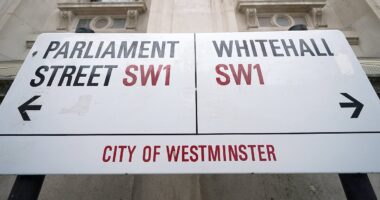The Wanted star Max George has sparked concern after revealing he’s been hospitalised with heart problems, and may have to undergo surgery over the festive period.
Fans will no doubt be shocked that the 36-year-old has been struck down with troubles that are traditionally associated with older people with far less healthy lifestyles.
But the ultra-fit athletic singer is far from the only young and seemingly healthy man to suffer heart problems — which are, more often than not, life-threatening.
In fact, the number of younger people with deadly heart problems, including heart attack, stroke and other cardiovascular diseases is rising.
And in some cases, the patients don’t resemble a typical heart disease sufferer.
Heart attacks in people aged 25-29 have almost doubled over the last decade, while the number of patients under 40 have risen by a quarter, NHS data from last year shows.
The level of heart attacks among people in England in their mid-twenties is the highest it’s been in a decade.
Official figures show that men are twice as likely to be hospitalised for a heart attack, compared to women.

The Wanted star Max George has sparked concern after revealing he’s been hospitalised with heart problems

The star revealed he may have to undergo surgery over the festive period which he said was a ‘huge shock’
Meanwhile, strokes are on the rise in young men too.
A recent MailOnline analysis of NHS data revealed that strokes among men aged under 39 have jumped by nearly a quarter over the last two decades.
Experts say that some of the rise is due to increasing unhealthy lifestyle choices that lead to obesity and high cholesterol, raising heart disease risk.
However there are some cardiac problems that can develop — or begin at birth regardless of the food you eat and the amount of exercise you do.
One of the most common is hypertrophic cardiomyopathy which affects 1 in 500 people in the UK and is the leading cause of sudden cardiac death in young athletes.
It causes the heart muscles and the walls of the heart’s chambers to become stretched, thickened of stiff. This affects the organ’s ability to pump blood around the body, the NHS explains.
Chest pains, shortness of breath, fatigue and fainting are all warning signs of the heart condition.
In most cases hypertrophic cardiomyopathy is inherited, but an unhealthy lifestyle, a viral infection or an underlying medical condition can also be triggers.

One of the most common is hypertrophic cardiomyopathy, it affects 1 in 500 people in the UK and is the leading cause of sudden cardiac death in young athletes
Another condition that mostly affects young people is Long QT syndrome, which has an average onset age of 14-years-old. Those who die from the illness are mostly around the age of 32.
It is relatively rare, affecting up to 1 in 2,000 people in the UK, and causes the heart to stop pumping blood to the brain properly, meaning it is temporarily starved of oxygen.
Warning signs include fainting, seizures and heart palpitations, but it can also trigger blackouts.
In most cases the heart’s rhythm returns to normal after a few minutes and the person will regain consciousness.
Stress, strenuous exercise and high doses of caffeine can be triggers for these episodes as can a slow heart rate during sleep.
However, many people only become aware they have the condition after having an ECG.

Symptoms such as a pounding or fluttering heart, dizziness, shortness of breath, chest pain and passing out are all warning signs that you should speak to your GP
Arrhythmias are another problem that can lead to life-threatening heart trouble.
They affect around 0.5 per cent of people under 40, and around two in every 100 children and young people.
It causes a problem with the rate or rhythm of your heartbeat — it may beat too quickly, too slowly or irregularly beat.
Shortness of breath, dizziness, fatigue and chest pain are all telltale signs of the condition.
It can also make you feel as though your heart is racing, fluttering or missing beats in episodes that can last a few seconds or up to a few minutes, the NHS warns.
Another type of abnormal heartbeat that affects one to three of every 1,000 adults and children worldwide is Wolff-Parkinson-White syndrome.
It occurs when there is an extra electrical connection in the heart which allows signals to bypass the usual route and form a short circuit.
This means the signals travel in a loop and triggers a fast heartbeat.
The extra electrical connection is caused by a strand of heart muscles that grows while a baby is developing in the womb.
Symptoms such as a pounding or fluttering heart, dizziness, shortness of breath, chest pain and passing out are all warning signs that you should speak to your GP.
Supraventricular tachycardia (SVT) is another type of electrical problem that affects around 1 in 400 people in the UK.
Although it can happen at any age, it often starts for the first time in children and young adults.
For many people their first symptoms are a very fast heartbeat, even when they are resting.
A normal resting heart rate is 60 to 100 beats per minute (bpm). But for people with SVT their heart rate can suddenly go above 100bpm.
Some people may also have chest pain, feel breathless and tired.
Conditions such as hypertrophic cardiomyopathy and long QT syndrome can be treated with medications to control blood pressure, correct an abnormal heart rhythm, remove excess fluid or prevent blood clots.
However, in more severe cases of long QT syndrome and arrhythmia patients may need a pacemaker or heart surgery.

















